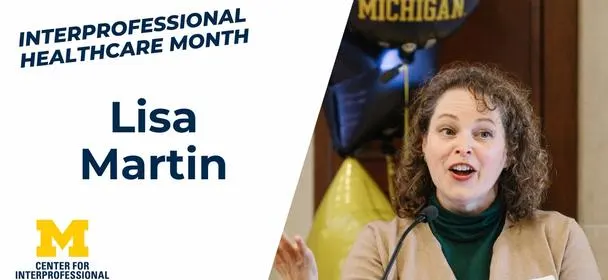For Interprofessional Healthcare Month, we are highlighting individuals and teams across the University of Michigan community who are making a difference in Interprofessional Education (IPE) and Practice (IPP).
Lisa Martin, Ph.D. is a Professor at the University of Michigan Dearborn joint appointments in Women’s and Gender Studies and Health & Human Services. She currently serves as the Department Chair for Health and Human Services and previously served as Director of the Women’s and Gender Studies.
What does interprofessional teamwork mean to you?
Interprofessional teamwork means that we are bringing a more complete and holistic perspective to whatever task we are trying to accomplish. My favorite way to work on creative projects, research, and problem-solving is to think in community - with others. When we have interprofessional teams that means learning about perspectives I don't have, which means that our solutions and ideas are better than anything I could have come up with on my own.
I get inspired by hearing my colleagues share their ideas and perspectives. When we are working as an interprofessional team, it doesn't just mean showing up with our disciplinary hats on - it means showing up with curiosity and a goal of learning from each other. It's not about showing what you and your discipline can bring to the table - true interprofessional teams have the ability to check their egos at the door - it's about creating something that couldn't have happened unless we were all there together. That interdependence on one another is where the magic happens for me.
What is a powerful example of interprofessional teamwork you’ve encountered or been a part of?
My longest-running research collaboration was with an interprofessional team that started long before I'd ever heard the term - back then we just thought of ourselves as interdisciplinary. Our core team consisted of people from medicine (physician), clinical social work, public health (health behavior/health education and management and policy), nursing, and others who came and went over the years.
We developed an intervention for healthcare workers that ended up addressing issues related to doing stigmatized work and burnout. In coming together, everything from the design of our intervention depended on our ability to learn about each other's perspectives - it shaped the activities we did in the intervention - from arts-based storytelling in collage-making and photoshop - to more didactic learnings - to free-writings, and self-reflections.
We started our project thinking that individuals in their profession needed self-care and what we learned throughout the process was that the team needed care - each member of those teams (that included physicians, nurses, social workers, counselors, medical assistants, office workers/receptionists, surgical assistants, and more) held part of their patient's experiences and stories. It was only by coming together that they could identify the whole story of the care this team provided and it was their connection through sharing their stories that healed and addressed some of the isolation and burnout they were experiencing.
This project started as a small pilot and was eventually replicated and morphed into something that has worked with thousands of healthcare workers over the world. It never would have happened if we didn't learn how to work together and see the interprofessional team as the optimal unit of intervention - not just the individual workers.
Could you share some information about your role in IPE at UM-Dearborn and its impact?
I serve as the UM-Dearborn representative on the EC for the Center and have been proud to represent Dearborn in a lot of Center initiatives. For the last 2 years, I've been serving as the lead for the Center's Undergraduate Pre-Health Initiative which has been working to introduce undergraduate students who are interested in health professions to some of the core IPE competencies.
Last Fall (Nov. 2024) we had our inaugural Pathways in Health: Professional Meet and Greet event that brought over 200 undergraduate students from across the UM campuses to explore and network with health professionals representing more than 12 different professions. We are excitedly planning next year's event, which we hope will be even bigger. We know that professional identity solidifies very quickly once students enter their graduate programs, so we hope that by exposing undergraduate learners to IPE concept and competencies, we can help them enter their professional training with a good foundation and understanding of why interprofessional education and practice are necessary to improve the quintuple aims of health.
I like to think of it as an inoculation against clinging too strongly to their singular, siloed professional identity. Of course we want students to be proud of their profession and learn how to be the best physician, nurse, pharmacist, dentist, etc. - but we also want them to know that they also need to work with their amazing interprofessional colleagues to really improve health. I want them to see themselves as inherently dependent and interconnected with one another - across disciplines, all growing together to make the health and healthcare ecosystems work better.
